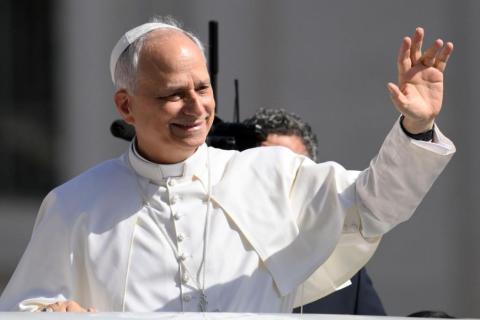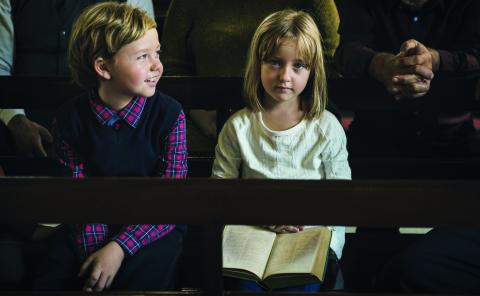
“A retired professor gets a new lease on life when a private investigator hires him to go undercover inside a San Francisco retirement home”—so reads the Netflix description of their comedy series, A Man on the Inside.
It is a good capsule, as far as it goes, adequately summarizing the basic premise of this new show. But it doesn’t, it couldn’t, begin to characterize the unique features of the delightful performance from the inimitable Ted Danson (Cheers, Three Men and a Baby, The Good Place, etc.). And even the categorization of the show as a “comedy series” doesn’t do justice to the layers of life portrayed in the eight-episode first season that dropped last November.
There is a tenderness to this show that keeps appearing in the variety of relationships and life passages that the characters encounter.
I use this word “tenderness” to quite intentionally evoke Pope Francis, who from his first homily as Pope in 2013, continuing to the hospital bed where he spent most of his final days, used that very word to describe the disposition of the heart the world needs to be fully human and alive.
In that very first homily, Pope Francis said we “must not be afraid of tenderness,” which he described as “not the virtue of the weak but rather a sign of strength of spirit and a capacity for concern, for compassion, for genuine openness to others, for love.”
Viewers familiar with Ted Danson from his iconic role on Cheers (1982-1993), might have a hard time picturing him as the star of a show that evokes the beauty of tenderness that the Holy Father has in mind. In A Man on the Inside, Danson portrays Charles Nieuwendyk, a widower facing his own grief and mortality—a very different role from the macho bartender ex-ball player Sam Malone of Cheers. While carrying the same comedic skill, now Danson adds a subtlety and humility to his portrayal of Charles. Here we see masculinity from the inside out, a “man on the inside,” growing in tenderness as he encounters the challenges of growing older.
But it is not just Danson’s Charles that expresses tenderness, it is an underlying element to numerous aspects of the show. Charles takes up residence in a retirement home managed by Didi (played by Stephanie Beatriz—some will remember her as Detective Rosa Diaz in Brooklyn Nine-Nine), a compassionate caregiver struggling with the pressures of her vocation. How to maintain a tender heart in the midst of death and dementia? The way she uses mindfulness practices to manage the trauma she carries in her body hints at an underlying spirituality that nourishes her own tenderness, her “capacity for compassion,” as Pope Francis put it.
Charles’ best friend at the home is Calbert, played with restraint and grace by Stephen McKinley Henderson—one of our great actors of both stage and screen. The portrayal of authentic male friendship that is also interracial (Henderson is Black) is a profile in tenderness that alone makes the show a gem. Here we see men delighting in each other as they play board games or go to a baseball game. They openly share their challenges as fathers, and mutually comforting each other in grief.
They process the ever-present reality of friends at the home with dementia and others who pass away. Then, most poignantly and with no spoilers shared, they face conflict in their relationship. Their “genuine openness”—arising from tenderness—is a type of masculinity not regularly held up in our popular culture’s portrayal of men and it is arguably the greatest achievement of the show’s creator Michael Schur, who gained notoriety as a writer and producer of The Office. In Charles and Calbert, we see a truth that Pope Francis spoke of, that “tenderness is not weakness…it is the path of humility.”
Special emphasis should also be given to the show’s embrace of the gifts and dignity of the elderly, and here again we see a striking congruence with values consistently upheld by Pope Francis. With increasing urgency, appreciation for the elderly emerged as a major theme in his pontificate, and in ways that dovetailed with the Holy Father’s encouragement of tenderness.
In Ted Danson’s A Man on the Inside we see a truth that Pope Francis spoke of, that “tenderness is not weakness…it is the path of humility."
In 2021, Pope Francis established the World Day for Grandparents and the Elderly, and in the leadup to the 2022 celebration he devoted a series of Wednesday catechesis addresses “on the meaning and value of old age.” His message for that year’s World Day was centered on his call to his fellow seniors to become “artisans of a revolution of tenderness” because “the elderly are not outcasts to be shunned but living signs of the goodness of God who bestows life in abundance.”
This tension between a culture that treats the elderly as “outcasts” and the “abundance” that can come when intergenerational relationships are maintained is beautifully present in A Man on the Inside. Calbert feels devalued in his relationship with his son and they have to work hard to build a relationship of dignity. Characters with dementia are portrayed with sensitivity to the vulnerable position they occupy in society. The development of Charles’ role as a father after his wife’s death is realistically portrayed, and the tenderness with his grandchildren is not cast as an automatic thing, but something that requires effort and commitment. It’s not an easy path.
Some of the show’s most poignant moments, in fact, are in the tensions between Charles and his daughter Emily, played by Mary Elizabeth Ellis (who is best known for her recurring role as a waitress on the FX sitcom, It's Always Sunny in Philadelphia). They have difficulties, but in Charles’ relationship with his family he slowly learns to become “the messenger of the wisdom of lived experience” that Pope Francis sees as the gift of the elderly and grandparents.
For all of its tenderness and its authentic inclusion of the elderly and grandparents, A Man on the Inside is a unique show—and its ability to carry those themes while bringing the laughs make it a popular show. The laughs are steady, the joy contagious, and the certainty of a second season, now (coming later this year), are all a cause for celebration. It’s family friendly, genuinely wholesome, and comfort viewing with a conscience.












